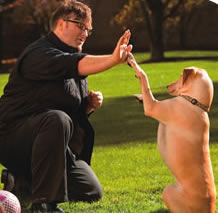Time to Play
Using recreation to rebuild the body

After a long week, everyone needs a way to unwind. So you might hit the driving range or sneak off to the basement to play a videogame. Or maybe you like to take the dog for walks in the park.
Unfortunately, the side effects of cancer treatment can impact favorite pastimes. That's why the University of Michigan Rogel Cancer Center now offers recreational therapy. Recreational therapy can help you regain a sense of normalcy while providing the motivation to rehabilitate your body and work toward improving its functioning.
"People think of recreation as a luxury, but it's extremely beneficial physically, mentally and emotionally," said Devyn Baker, the Rogel Cancer Center's certified recreational therapist. "When you're out on the golf course, you're walking, you're socializing, and you're using all kinds of muscles when you tee off. But the activity distracts us from all the work our body is doing."
Baker meets with patients individually to discuss goals and develop a plan to achieve them. For example, a golfer who has been treated for breast cancer may develop weakness that may impact her range of motion. Baker will work with the patient to practice her swing and gradually rebuild strength. He also will recommend equipment adjustments-such as different golf clubs -- that will help improve her game.
While the patient is focusing on getting back to the golf course, the therapy is helping her to restore body function, build confidence and lead a full life.
Baker, whose work is funded through donations, also helps patients recover skills related to less active pastimes, for example, knitting or finding more comfortable ways to spend time with a pet.
"We can look at things as simple as the way your dog jumps up in your lap or, if you're suffering from weakness on one side of your body, how to use your stronger side to interact with your pet," he said. "Our goal is to help you find ways to get back to the activities you love."
Read the Winter, 2009 issue of Thrive.
